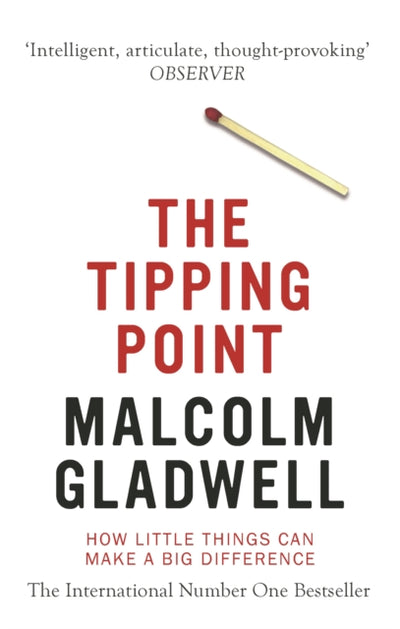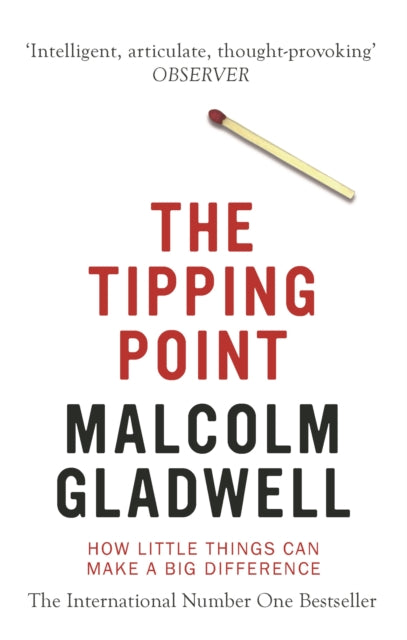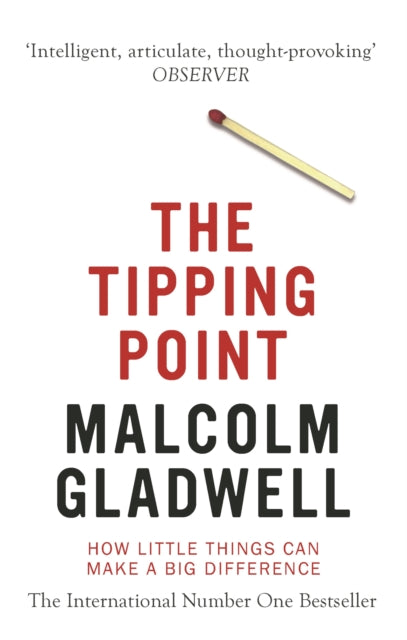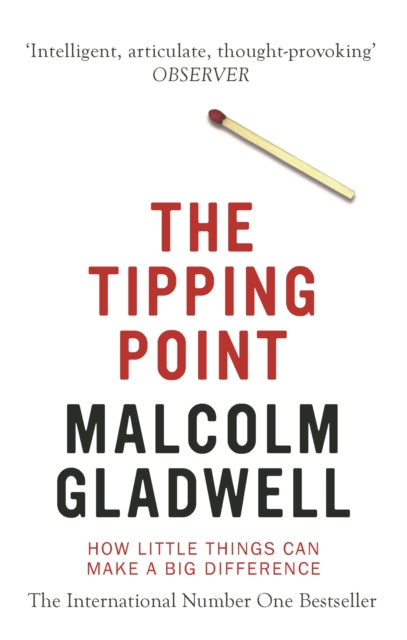The Tipping Point: How Little Things Can Make a Big Difference
The Tipping Point: How Little Things Can Make a Big Difference

MALCOLM GLADWELL
The Tipping Point: How Little Things Can Make a Big Difference
Zaloga po trgovinah
Rezultati:
Podrobnosti o izdelku
Poglej vseISBN
9780349113463Mladinska knjiga ID
241052Leto izida
2001Velikost (šxdxv)
100 × 100 × 100Status dobavljivosti
7-10 delovnih dniJezik
ANGTeža
100 gZaložnik
LITTLE BROWNAvtor
MALCOLM GLADWELLOpis
THE TIPPING POINT is the biography of an idea, and the idea is quite simple. It is that many of the problems we face - from crime to teenage delinquency to traffic jams - behave like epidemics. They aren't linear phenomena in the sense that they steadily and predictably change according to the level of effort brought to bear against them. They are capable of sudden and dramatic changes in direction. Years of well-intentioned intervention may have no impact at all, yet the right intervention - at just the right time - can start a cascade of change. Many of the social ills that face us today, in other words, are as inherently volatile as the epidemics that periodically sweep through the human population: little things can cause them to 'tip' at any time and if we want to understand how to confront and solve them we have to understand what those 'Tipping Points' are. In this revolutionary new study, Malcolm Gladwell explores the ramifications of this. Not simply for politicians and policy-makers, his method provides a new way of viewing everyday experience and enables us to develop strategies for everything from raising a child to running a company.
Publisher and industry reviews
Jacket review
Gladwell argues that many contemporary problems - from crime to teenage delinquency and traffic jams - behave like epidemics that are capable of sudden and dramatic changes in direction. Yet the right intervention at just the right time - the Tipping Point - can start a cascade of change and provide a method for developing strategies for everything from raising a child to running a company.
UK Kirkus review
You can't help feeling that when Malcolm Gladwell was a schoolboy, his teachers probably described him as 'too clever by half'. This is a very clever book indeed, but whether its central thesis holds water or not is another matter. Gladwell's argument is simple. He believes that social epidemics, like disease epidemics, can be caused by very small and apparently insignificant events. There's a 'tipping point' at which a particular phenomenon, whether it's an idea like Methodism or a fashion like the unexpected trend for wearing Hush Puppies in the mid-1990s, suddenly becomes an epidemic. Overnight, everyone is doing it. There are three rules which make something 'tip', according to Gladwell. He has named these the Law of the Few, the Stickiness Factor and the Power of Context. The Law of the Few says that certain people are good at spreading ideas - without those people on board, the idea won't spread. The Stickiness Factor says, in essence, that there has to be something about the idea or fashion that makes it 'stick' - that makes it memorable. And the Power of Context pretty much boils down to the idea that you have to be in the right place at the right time. You can have a great message and great people to spread the message but if you're trying to sell snow to Eskimos, then you're not going to succeed. It's a compelling argument, and Gladwell uses lots of engaging examples to illustrate his point - the success of Sesame Street, the reduction in violent crime in New York, the rise in cigarette smoking in teenagers. The book is lightly peppered with research findings from social psychologists that back up his argument. It's easy to read, presents a seductively simple idea we can all understand and relate to, and flatters the reader by suggesting that the thesis is backed by academic research. It's 'sticky', all right. Unfortunately, it's also very glib. There are no shades of grey - nothing that suggests there are ever any flaws in the thesis. After all, what if a phenomenon has all the rules Gladwell identifies and still doesn't create an epidemic? How would we know? There are elements to the argument that are tautological. How do we know a message is 'sticky'? Well, because it sticks. And why does it stick? Because it's 'sticky', of course. Perhaps the most striking aspect of the glibness comes when Gladwell cites academic research to back up his views. For example, he argues that there's a correlation between smoking and depression - that depressed people smoke because smoking prompts their brain to produce chemicals such as serotonin that regulate happiness. In other words, they are treating their own depression. But this is dangerously over-simplifying a complicated area. There are other explanations for the correlation, including the possibility that smoking is what makes people depressed in the first place. This is undoubtedly a very enjoyable book. It's thought-provoking too, and readers will no doubt come up with their own examples of phenomena that have 'tipped'. But it's worth reading with a critical mind - it's not all quite as straightforward as Gladwell would have us believe. (Kirkus UK)
Pogosto kupljeno skupaj
Prikaži vse podrobnosti

Mehka
Ostali so si ogledali tudi ...


Več kot pol milijona knjig
Največja ponudba slovenskih in tujih knjig na enem mestu.

Enostaven nakup
Do izbranega le z nekaj kliki na spletu ali v eni od več kot 50 knjigarn.
Strokoven nasvet
Pred nakupom nas pokličite za nasvet ali se oglasite v knjigarni.

Vse za šolo
Nagrajena izobraževalna gradiva in kakovostne potrebščine.

Celovita ponudba za dom in pisarno
Vrhunski izdelki priznanih blagovnih znamk.
Brezplačna dostava
Brezplačna dostava za vsa naročila nad 59 € (za šolske pakete nad 140 €)
Knjigarne
Zaloga
×Osveženo 26.03.2023 10:09
Slovenska cesta 29, 1000 Ljubljana
E-naslovSpletna knjigarna: info@emka.si, Mladinska knjiga Založba: info@mladinska-knjiga.si
Kontakt01 241 30 00
Brezplačna številka080 12 05
Prijava na e-novice
© 2026 Mladinska knjiga. Vse pravice pridržane.
- Ko izberete elemente, se celotna stran osveži.
- Odpre se v novem oknu.















